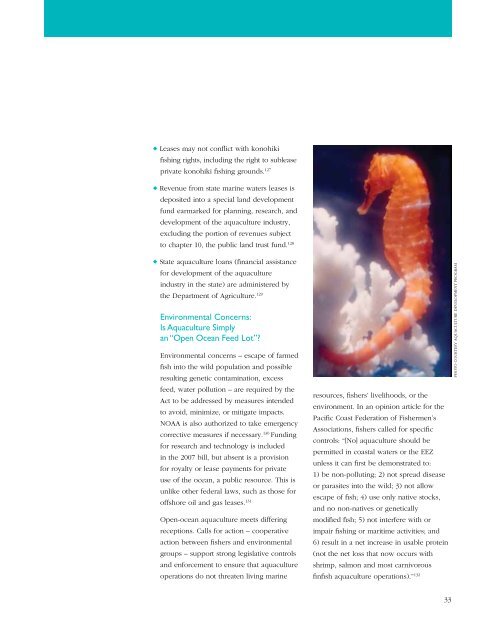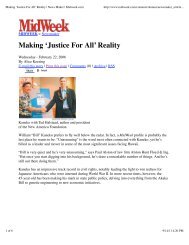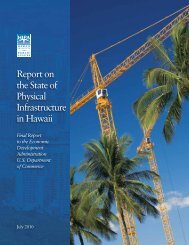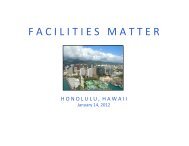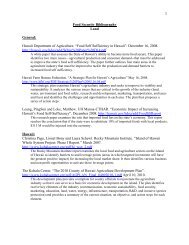Hawai'i Fisheries Initiative - The Hawaii Institute for Public Affairs
Hawai'i Fisheries Initiative - The Hawaii Institute for Public Affairs
Hawai'i Fisheries Initiative - The Hawaii Institute for Public Affairs
You also want an ePaper? Increase the reach of your titles
YUMPU automatically turns print PDFs into web optimized ePapers that Google loves.
u Leases may not conflict with konohiki<br />
fishing rights, including the right to sublease<br />
private konohiki fishing grounds. 127<br />
u Revenue from state marine waters leases is<br />
deposited into a special land development<br />
fund earmarked <strong>for</strong> planning, research, and<br />
development of the aquaculture industry,<br />
excluding the portion of revenues subject<br />
to chapter 10, the public land trust fund. 128<br />
u State aquaculture loans (financial assistance<br />
<strong>for</strong> development of the aquaculture<br />
industry in the state) are administered by<br />
the Department of Agriculture. 129<br />
Environmental Concerns:<br />
Is Aquaculture Simply<br />
an “Open Ocean Feed Lot”?<br />
Environmental concerns – escape of farmed<br />
fish into the wild population and possible<br />
resulting genetic contamination, excess<br />
feed, water pollution – are required by the<br />
Act to be addressed by measures intended<br />
to avoid, minimize, or mitigate impacts.<br />
NOAA is also authorized to take emergency<br />
corrective measures if necessary. 130 Funding<br />
<strong>for</strong> research and technology is included<br />
in the 2007 bill, but absent is a provision<br />
<strong>for</strong> royalty or lease payments <strong>for</strong> private<br />
use of the ocean, a public resource. This is<br />
unlike other federal laws, such as those <strong>for</strong><br />
offshore oil and gas leases. 131<br />
Open-ocean aquaculture meets differing<br />
receptions. Calls <strong>for</strong> action – cooperative<br />
action between fishers and environmental<br />
groups – support strong legislative controls<br />
and en<strong>for</strong>cement to ensure that aquaculture<br />
operations do not threaten living marine<br />
resources, fishers’ livelihoods, or the<br />
environment. In an opinion article <strong>for</strong> the<br />
Pacific Coast Federation of Fishermen’s<br />
Associations, fishers called <strong>for</strong> specific<br />
controls: “[No] aquaculture should be<br />
permitted in coastal waters or the EEZ<br />
unless it can first be demonstrated to:<br />
1) be non-polluting; 2) not spread disease<br />
or parasites into the wild; 3) not allow<br />
escape of fish; 4) use only native stocks,<br />
and no non-natives or genetically<br />
modified fish; 5) not interfere with or<br />
impair fishing or maritime activities; and<br />
6) result in a net increase in usable protein<br />
(not the net loss that now occurs with<br />
shrimp, salmon and most carnivorous<br />
finfish aquaculture operations).” 132<br />
Photo courtesy Aquaculture Development Program<br />
33


